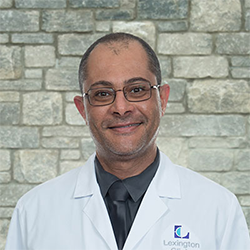By Walaa Ayoub, MD, Lexington Clinic Endocrinology
Nearly 20 million Americans have a thyroid disease, but 12 million may be unaware of their condition. The thyroid is a small, butterfly-shaped gland at the base of the neck that is vital to regulating the body’s metabolism, growth, and development. The thyroid produces hormones that affect heart rate and temperature. These hormones affect the functioning of nearly every organ. If your thyroid is not working properly, it can hurt your overall health.
Some of the most common thyroid-related illnesses are hyperthyroidism, hypothyroidism, Hashimoto’s thyroiditis, thyroid nodules, and thyroid cancer.
Hyperthyroidism, also called thyrotoxicosis, is an overactive thyroid gland, resulting from the thyroid creating too many hormones. Symptoms include irregular heartbeat, increased sweating, tremors, trouble sleeping, too-frequent bowel movements, and in women, changes in periods. Hyperthyroidism may be caused by Graves’ disease, which is an autoimmune condition, or inflammation of the thyroid. Graves’ is the most common cause, and happens more often in younger women than in other patients, but could affect anyone. Graves may also run in a family. Treatment of hyperthyroidism is usually accomplished with medication but may require surgery in more severe cases.
Hypothyroidism is the opposite of hyperthyroidism; it is an underactive thyroid gland. This can lower your body temperature, increase your fatigue, cause forgetfulness, even drier skin, and bowel irregularity. Because there are many symptoms, the only way to determine for certain if you have hypothyroidism is a blood test. It may have multiple causes, including autoimmune diseases, imbalance in iodine levels, or from certain medications. For most patients, hypothyroidism can be controlled by supplementing the T4 hormone the thyroid is unable to make.
Hashimoto’s thyroiditis is an autoimmune condition that causes the development of antibodies that in turn damage the thyroid. This can lead to inflammation, which may cause the gland to enlarge, known as goiter, and cause hypothyroidism. The goiter can cause difficulty swallowing, and unpleasant pressure in the neck. Treatment of Hashimoto’s thyroiditis may involve medication, depending on the severity of the condition.
Thyroid nodules are growths on the thyroid gland. 90% of the time, these are non-cancerous. Nodules rarely cause symptoms and are usually discovered during routine exams. It is possible a nodule could cause the thyroid to create extra hormone, leading to hyperthyroidism. Nodules are common, with about half of all people developing at least one by the age of 60. There isn’t much necessary for the treatment of most nodules except for monitoring. For those nodules that are found to be cancerous, surgery may be necessary.
Thyroid cancer is fairly rare compared to other cancers. It is estimated about 900,000 Americans are living with a form of thyroid cancer. Thyroid cancer often responds well to treatment and is curable with surgery. Thyroid cancer is usually detected through neck examinations, or ultrasounds or CT scans done for unrelated medical issues. This type of cancer rarely presents symptoms. If the cancer has grown big enough to press against the esophagus or windpipe, it could lead to trouble swallowing or breathing. Treatment for thyroid cancer usually requires surgery to remove the tumor. If the cancer has spread, further surgery may be necessary. Your doctor may also prescribe radioactive iodine therapy to destroy the remaining cancer cells following surgery.
Most thyroid conditions are not deadly and respond well to treatment. As in all medical conditions, the earlier you act, the better, as conditions left untreated may worsen. Make an appointment with one of Lexington Clinic’s board-certified endocrinologists to get diagnosed and any necessary treatment started.

Dr. Walaa Ayoub is board-certified in Internal Medicine and board-certified in Endocrinology. He pro-vides services in general endocrinology and metabolism, diabetes mellitus, obesity and lipid-related disorders, thyroid and parathyroid disorders, pituitary disease, osteoporosis and ad-renal disorder. Dr. Ayoub’s professional interests include diabetes mellitus, obesity and lipid-related disorders and osteoporosis and other bone and mineral-related disorders. Dr. Ayoub can be reached at (859) 258-4401.
For help scheduling an appointment or to find the location closest to you, visit LexingtonClinic.com.







